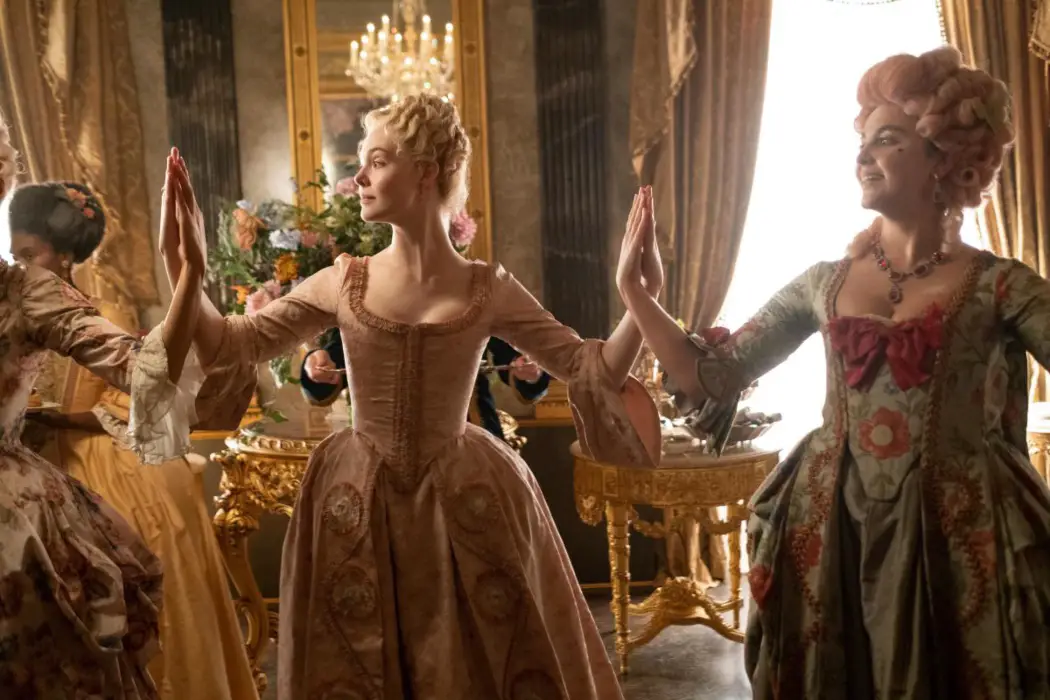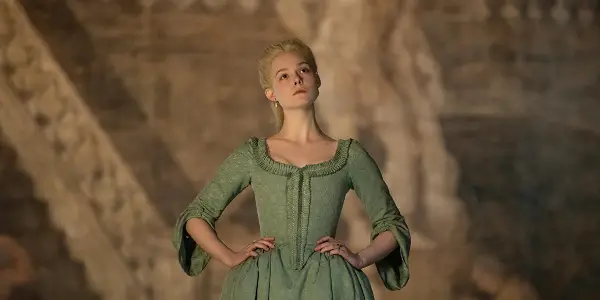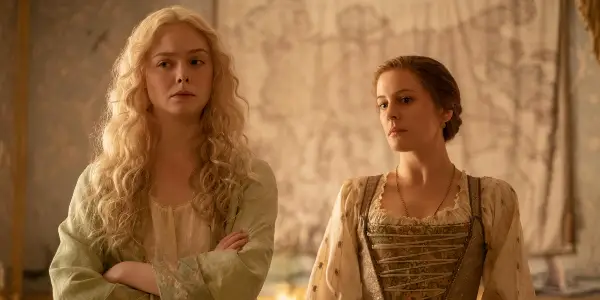THE GREAT Season 1: Brutal, Raunchy & Relevant

Reyzando Nawara is a passionate film and TV enthusiast from…
It’s hard to not think about Yorgos Lanthimos’ Oscar-nominated The Favourite while watching The Great, Hulu’s new period dramedy about the famous Russian Empress Catherine the Great. Both are penned by the same writer Tony McNamara. Both also tell the anachronistic version of real histories to brilliant results. But where the former focuses on the power struggle and sexual tension of three royal ladies in position, the latter has a lighter and more optimistic tone as it reimagines the early rise of the longest-reigning female ruler in Russia’s history. The result is exceptional and hilarious, complete with colorful performances from the talented ensemble, lavish set designs, and profanity that operates on the same level as Succession.
Fighting for Power
Set in the 18th century where Russia was on an endless and losing war against Sweden, The Great begins with the German-born Catherine (Elle Fanning) as she’s trying to fit in as the new wife of Emperor Peter III (Nicholas Hoult) in a court that only cares about drinking, sex, and war. When we first meet Catherine, she’s naive and full of hope. But she’s not just some damsel in distress who only wants to make her husband love her. She’s also smart and progressive, with goals of bringing art and science to the people of Russia, and helping women and children to be more literate.

The problem is, Peter isn’t exactly the kind of leader who accepts modernity. He thinks that being progressive is a goal that Russia doesn’t need at the moment. So when Catherine builds a school for women, Peter decides to burn it down. Not just to make a point, but also to hurt Catherine so that she won’t be doing anything like that anymore. This, of course, makes Catherine despise Peter and everything he stands for. But being a woman in that era means that you have no power. So for Catherine, there’s nothing she can do about her issue except to slash her wrists, until Marial (the wonderful scene-stealing Phoebe Fox), Catherine’s servant who was once a lady of the court, proposes a coup by informing her that if the Emperor dies, then it’s the Empress who will replace him.
Throughout the first season, it’s Catherine’s journey of putting her coup into action that becomes the focus of the story. We see her recruiting more allies along the way. First, there’s the Emperor’s adviser Orlo (Sacha Dhawan), who shares the same value as Catherine. Then there’s Leo (Sebastian De Souza), a lover gifted to Catherine by Peter so that he won’t feel guilty for sleeping with other women, and Elizabeth (Belinda Bromilow), Peter’s aunt who’s as progressive as Catherine is. She also tries to approach Archie (Adam Godley), the court’s Archbishop who represents the church, though it results in nothing but suspicion. And beyond that, we also see Catherine’s dedication to building a new philosophical backbone for a better Russia.
All this plotting to overthrow Peter, along with all the secret meetings that Catherine has with her allies, is where The Great gets most of its tension. We never know who really says the truth to Catherine, or who will be sacrificed along the way. And that makes the experience a lot more exciting. But the real joy of watching all ten episodes doesn’t lie in whether Catherine will succeed or not — we all know that she will unless McNamara goes full Inglorious Basterds and rewrites the source material. Instead, the greatest pleasure lies in witnessing Catherine’s growth throughout the show.

She begins the first half of the show as someone who is fearless. She knows what she wants and how to achieve it. But it doesn’t change the fact that she’s also an outsider who doesn’t fully know about Russia yet, and only thinks that she’s better than Peter because of her progressive vision. Watching her slowly realizing that she might not be as perfect of a leader as she’s expected herself to be is poignant. But on the other hand, it’s also empowering when Catherine forces herself to learn about Russia. She listens to other people, especially when it comes to war strategy. She’s clearly trying to be the kind of leader that Peter is not, and that is pretty uplifting.
Catherine’s evolution throughout the season is believable thanks to Fanning’s phenomenal performance. She shows vulnerability and insecurity without eschewing the parts of Catherine that is confidence and cunning. And more than that, her jokes delivery is also impeccable. To balance a tricky mix of comedy and drama is never an easy job, but Fanning, who rarely gets a comedic role, is really marvelous here at breathing life into a complex character like Catherine.
Peter the Awful
The Great, however, isn’t just studying Catherine’s journey of grabbing power from her man-child husband. But it also focuses on Peter, and even gives him an opportunity to show rare moments of humanity that other Catherine the Great iterations haven’t done before. But where Catherine’s arc is about her becoming a formidable leader of Russia, Peter’s story here is to show us just how awful he is as a human being despite some redeeming qualities shown in the second half of the season.
Hoult plays Peter to perfection. He’s rude and insensitive, and Hoult makes sure we know that about his character. When he’s not busy trying to win a war against Sweden, that Russia has lost, Peter likes to spend his day hurting other people in every possible way. He also likes to have sex with Georgina (Charity Wakefield), who is the wife of his best friend Grigor (Gwilym Lee), without thinking of both Catherine and Grigor’s feelings. Yes, he’s that awful. But there’s also a moment when Peter is just a boy seeking for validations from other people, mostly from his dead mother and father, even though it happens briefly.

What’s even more interesting about the way McNamara portrays Peter is how it also mirrors our current reality. Peter stands for every leader who thinks that women are just an ornament. A leader who doesn’t listen to other people just because he doesn’t wanna be seen as inferior or proven wrong. Of course, this funhouse reflection to reality may not initially be what The Great wants to address in the first place. But upon watching all ten episodes, the issues that McNamara explores here, from sexism and inequality to incompetent leaders pushing their countries down to the edge of extinction for not listening to the experts, actually inform about the present more than it does about the past.
And that’s what eventually makes The Great feel relevant. It shows us that the problems we’re dealing with right now have happened a long time ago and that our society hasn’t exactly made that much of a progress. This may sound pretty heavy and serious, but The Great actually is far from that. McNamara’s script is so hilarious and raunchy. Even when things go really dark, not to mention dragging midways to the second half of the season, the show remains delightful because of the humor. And that’s pretty rare for period pieces.
Final Thought
Until the season finale, The Great never attempts to teach us a history lesson about Catherine or about Russia —HBO has that in their pocket with Hellen Mirren’s miniseries Catherine the Great. But that’s for the better of it. What it does instead is have fun, offering a unique period drama that is part entertaining, brutal, and raunchy all at once, just exactly the kind of escapism that we all could use right now. Huzzah!
What do you think of the ending? Let us know your opinion on the comments!
All ten episodes are available to stream on Hulu.
Watch The Great
Does content like this matter to you?
Become a Member and support film journalism. Unlock access to all of Film Inquiry`s great articles. Join a community of like-minded readers who are passionate about cinema - get access to our private members Network, give back to independent filmmakers, and more.
Reyzando Nawara is a passionate film and TV enthusiast from Indonesia. When he's not watching TV and movies, he likes to cook and make sorbet.












